When it comes to storage for your personal or business items in the UK you generally have two options - self-storage units/rooms or container storage.
In this guide we look at the features of the two storage options, their individual pros and cons and the difference in cost.
What's the difference between self-storage and container storage?
The key differences are access, cost, range of unit sizes and how you move your items in and out of storage.
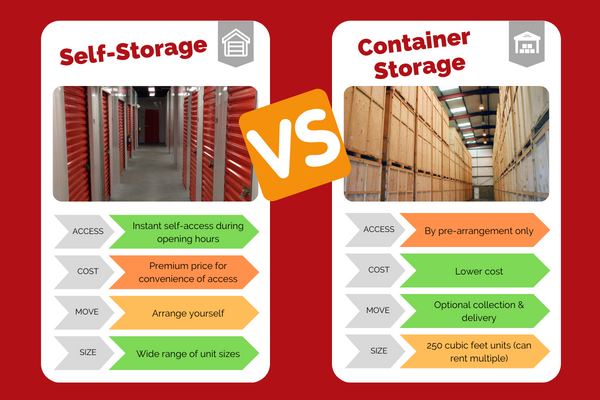
Typically self-storage companies offer:
- Instant access during opening hours
- Arrange own delivery and collection of items
- Premium pricing due to access
- Extensive range of unit sizes
- Secured using your own padlock/key code
Most container storage companies offer:
- Access by prior arrangement only
- Optional collection and delivery of items
- Lower costs
- Rent as many containers as you need
- Typical units are 250 cubic foot (37 square foot) wooden or 20' steel container
What is self-storage?
-jpg.jpeg?width=640&name=joshua-coleman-ZVkDLrXGMdw-unsplash%20(2)-jpg.jpeg) Photo by Joshua Coleman on Unsplash
Photo by Joshua Coleman on Unsplash
Technically, 'self storage' is rental of a storage space that you load, unload and manage access to yourself.
The most common type of self-storage facility is a dedicated building or outdoor space filled separated into individual storage rooms of varying sizes, sometimes over several floors. Typically self-storage facilities have the following features
Features of Self-Storage Facilities
- Instant access during opening hours
- Arrange own delivery and collection of items
- Premium pricing due to access
- Extensive range of unit sizes
- Secured using your own padlock/key code
Self-storage container access
You can normally access your unit freely during opening hours. Typically self-storage facilities open 7 days a week, some 24 hours a day. This makes self-storage a good option if you need frequent and unplanned immediate access to your items.
Moving items into self-storage units
You'll have to arrange delivery of items and loading into your container yourself, and the same when you want all/any items back out of storage. Some facilities have partnerships with van rental providers or man and van services that you can hire to help you do this, else you can normally drive your own vehicle to the loading area or use a moving company.
Loading areas are often open access for all customers so it's worth noting quieter times of day to access if you want to avoid the crowds and make it easier to load/unload.
Loading bays aren't usually right next to your storage room at locations where storage rooms are inside a larger warehouse, so be prepared to carry your items to your unit. Often elevators and trolleys are provided to help you do this, but it's a good idea to ask to see the unit you'll be renting and evaluate access if you're storing larger or heavier items that could be awkward to move.
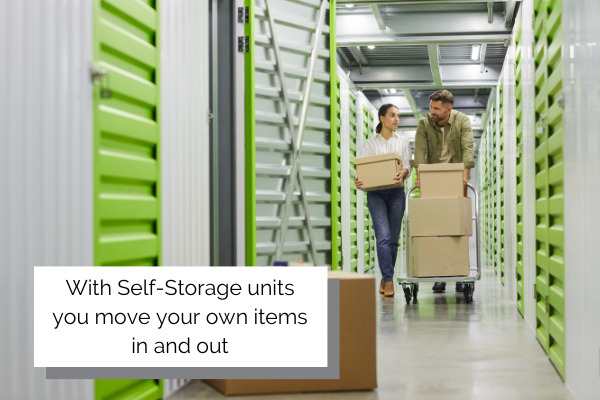
Size of Storage Units and types
Size of storage rooms/units vary depending on the facility, typically these are measured in square feet and range from a single locker to upwards of 250 sq feet (double garage).
Some facilities even offer climate-controlled storage, office spaces or rooms you can use as work spaces.
Security of self-storage facilities
Most self-storage facilities are very secure, covered by CCTV (always check) with staff on site at all times. Where sites are not manned you may need an access code to enter. Your individual room or unit is normally secured with a padlock and key, or keypad access. It's always important to check the security of the facility you're considering meets these standards.
What is container storage?
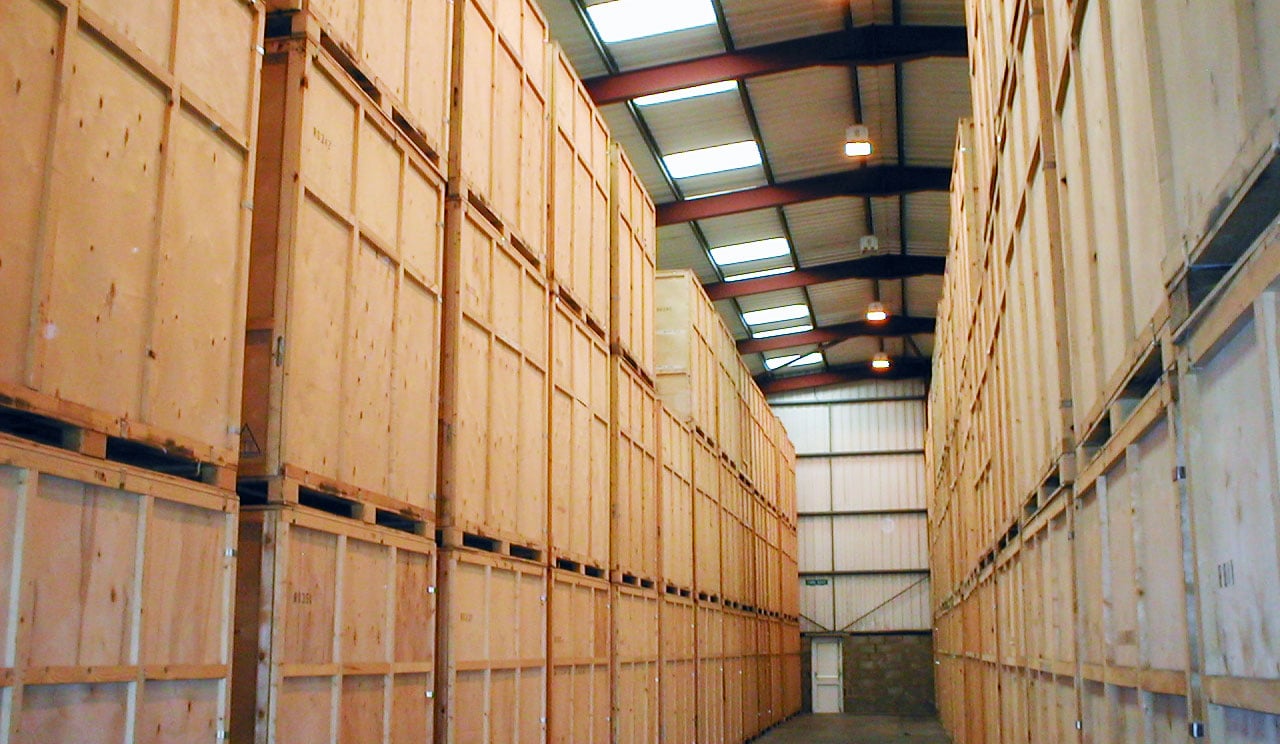
Container storage is where your items are stored in an individual wooden container (or multiple containers) inside a warehouse OR large 20ft steel containers in a secure compound. These are often operated by removal companies as storage and home moves often go hand in hand.
Container storage companies typically offer storage with collection and delivery, but some also offer self-storage services using containers.
Features of Container Storage Facilities
- Access by prior arrangement only
- Optional collection and delivery of items
- Lower cost
- Rent as many containers as you need
- Typical units are 250 cubic foot wooden or 20' steel container
Access to Container Storage Warehouses
Access is usually by prior arrangement only, typically at least 24 hours. This allows the warehouse operators to bring your container to a safe viewing area for you to access your items. If you don't need frequent or unplanned immediate access to your items this is usually fine for most customers.
Moving items into Container Storage
Some container storage warehouses only offer a collection and delivery service, others offer a hybrid service where you can bring your own items in.
Collection and delivery services: Most container storage facilities are operated by Removal Companies, meaning they also offer a professional collection and delivery service. This can be really helpful if you're moving lots of items into store, or if you have anything heavy or awkward to lift.
Staff will be trained in the art of moving which reduces the risk of anything getting damaged (or your back getting hurt!). You'll usually be given a full inventory of items taken into storage in case you need anything retrieved and to ensure everything is checked off when/if you want it delivered.
Many removal companies will have vehicles specially designed to hold wooden containers, meaning they can be loaded directly at your home and then taken straight by forklift into the storage warehouse. This reduces the amount of handling needed and the risk of damage.
%20-%20Loading.jpg?width=1200&height=800&name=June%2024%20(11)%20-%20Loading.jpg)
Self-store containers: As with self-storage facilities, many container storage warehouses also offer a hybrid service - self-storage in containers. They will allow you to bring your own items in and load them into your container yourself. Your container will usually be placed in a safe loading area and you'll be able to park right next to it for easy loading without long walks, tight elevators or narrow corridors to navigate.
As access is by arrangement only loading areas shouldn't be overcrowded meaning you have lots of space to safely load or unload your container.
Help loading: Some self-storage warehouses have permanent staff that can be hired to help you load or unload your container.
Security of Container Storage Warehouses
Once your container is safely inside the warehouse no one other than the warehouse staff has access. Typically containers are locked with a padlock and warehouses are secured using alarm systems, with many also having 24hr CCTV, making container storage a very secure method of storage.
Size of Storage Containers and types
Wooden containers: Standard size wooden containers are roughly the size of a small garden shed. w: (1.6m x d: 2.2m x h: 2.4m). They are around 37 square feet in size and can hold approximately 250 cubic feet of items.
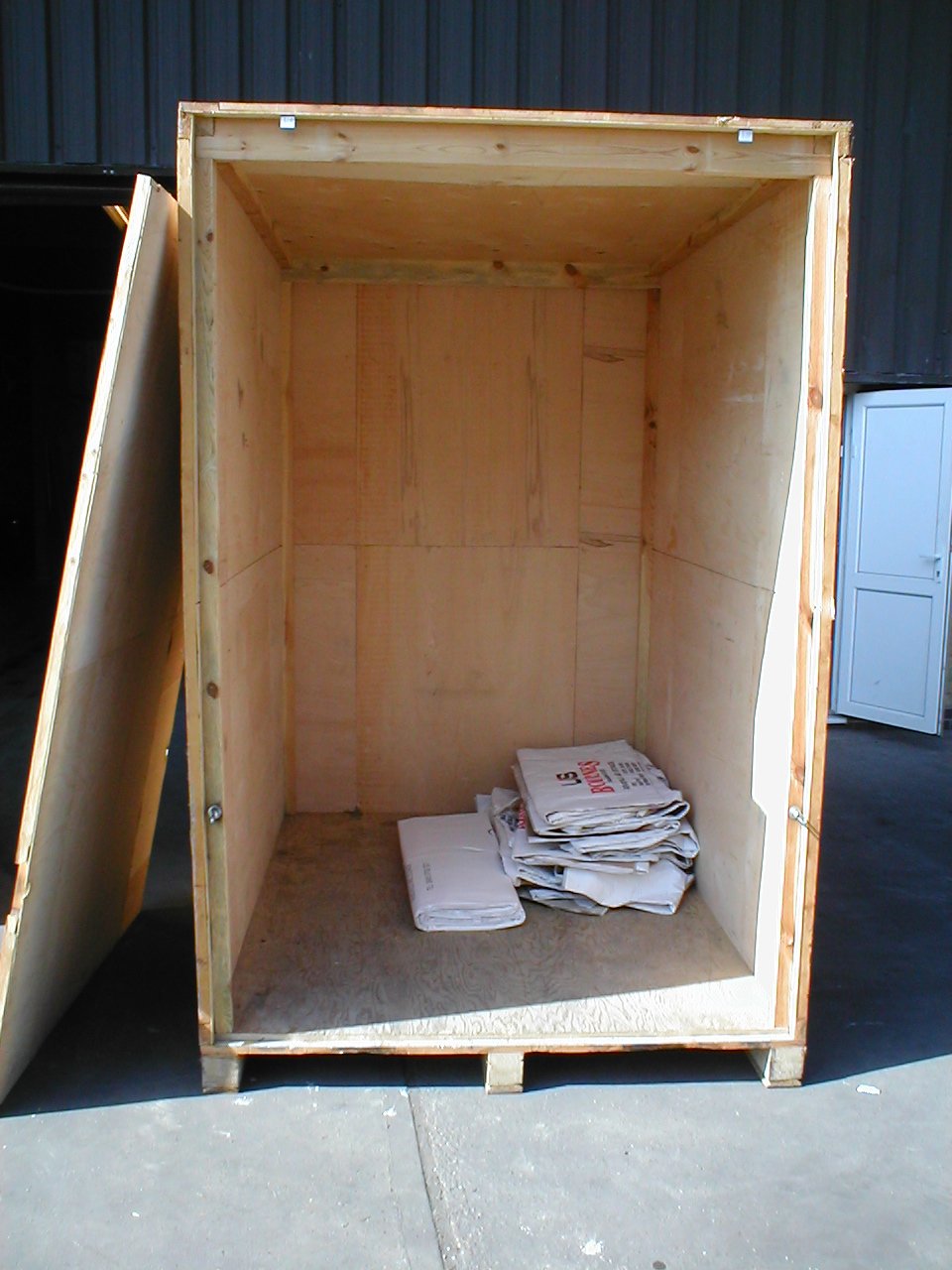 A typical wooden storage container
A typical wooden storage container
Steel containers: Some container storage companies also ofter 20ft steel containers, which are around the size of a single garage (w:8ft x h:8ft6" x l:20ft) and hold around 1050 cubic feet of items.
Large/Oversized items: Many container storage warehouses also have dedicated spaces for large or oversized items that don't fit in a container.
Some container storage warehouses are even climate controlled and have storage space for cars, motorhomes and boats.
costs of self-storage vs. container storage
IIn a recent market research study we identified that container storage can be up to 70% cheaper than self-storage units (based on a single container after any offer period). This is usually because you don't pay for the convenience of frequent unplanned access that self-storage facilities are designed for.
Why is container storage cheaper than self-storage?
Unlike self-storage facilities container storage warehouses tend to have lower costs - from the cost of installing lots of smaller units within a bigger building to the number of staff required to manage a high-traffic site, and the maintenance that goes with it.
Container warehouses are usually able to use more of the available floor space in the warehouse as containers are stacked and you don't need to leave space for stairs, lifts or corridors - this means more customers can utilise the same floor space for a lower cost each.
Comparing storage costs
The cost of storage can vary depending on where you live, so we always recommend shopping around a little before committing, unless you have a strong preference.
Understand introductory offers
Many storage providers offer attractive discounts for the first weeks/months of storage, reverting to a higher rate once that period is up. When comparing costs make sure you have checked what the true cost of storage will be for the entire period you plan to rent it.
Understand any additional charges
Some common additional fees to look out for that you need to account for are:
- Insurance - if this is included, check what it covers. If it's not included what is the cost and what protection does it provide? (Fire and flood? Theft? Damage?)
- Security - do you need to provide your own padlock or pay for a key?
- Access - are there any charges for access (either to move into/out of storage or ad hoc during your period of rental).
Length of contract
Most storage charges are advertised as a weekly rate, but some storage companies have monthly contracts meaning if you end your rental mid-way through a month you'll still pay for the full month. It's also important to check the minimum length of contract (particularly if an introductory discount has been offered) and any notice you have to give to vacate.
Is self-storage worth the extra cost?
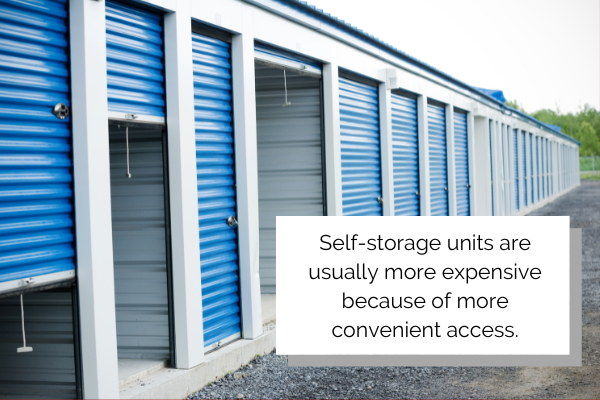
Self-storage costs can be significantly higher than containerised storage. Whether it's worth the cost or not depends on what you're looking for, particularly when it comes to access, so this is worth considering carefully before choosing the time of storage you'll use.
If you need frequent or unplanned access to your items then yes, you'll need to pay extra for the convenience. If you don't, containerised storage can be more cost effective.
Ask yourself how often you'll need to access your items, and if this is likely to be last minute or if you'll usually know at least a few days in advance.
What is the best type of storage for me?
The answer to this question is mostly about accessibility vs. cost
- Where is the storage facility located? If you need to access it regularly, look for a facility close by.
- Do you need regular, unplanned access?
- Do you need help loading/unloading?
Here's a couple of situations to help explain what might be right depending on what you need.
Best type of Storage between house moves
In our opinion, container storage wins this one hands down. Not only will it be cheaper, but using a single removal and storage company end to end for your move keeps one company in full control of your belongings. This makes everything easier to plan and coordinate, reduces the risk of damage and ensures just one party is accountable for everything.
Best type of Seasonal storage
You can usually plan in advance to access seasonal items like winter clothes, Christmas decorations or travel luggage and summer beach gear, so if it's just a straight swap of some items in and some out two or three times a year container storage may save you money. You just need to make an appointment for access when you're almost ready.
However, if you need space for equipment like surf boards, bikes or diving kit and you're a 'last minute trip' kind of person, then self-storage may allow you to be a bit more spontaneous.
Best type of storage for business stock
Self-storage is likely to be best for business stock as you'll probably need access multiple times a week and won't always know when you need to fulfil an order, take a delivery or re-stock your shelves. The immediate access of self-store facilities will make managing your stock more convenient.
Best type of storage for extra space at home
This is a tricky one and depends how often you'll need to access. If you've outgrown your home and just need some extra space for the things you don't need very often then containerised storage with pre-arranged access should suit you fine, at a lower cost. However, if you're putting the type of items you might need urgently into storage then paying the premium for self-storage may be better for you.
So, there you have it - the difference between self-storage and container storage is access, cost, moving in and out and the range of sizes available. What's right for you depends on your individual needs.

.png)










